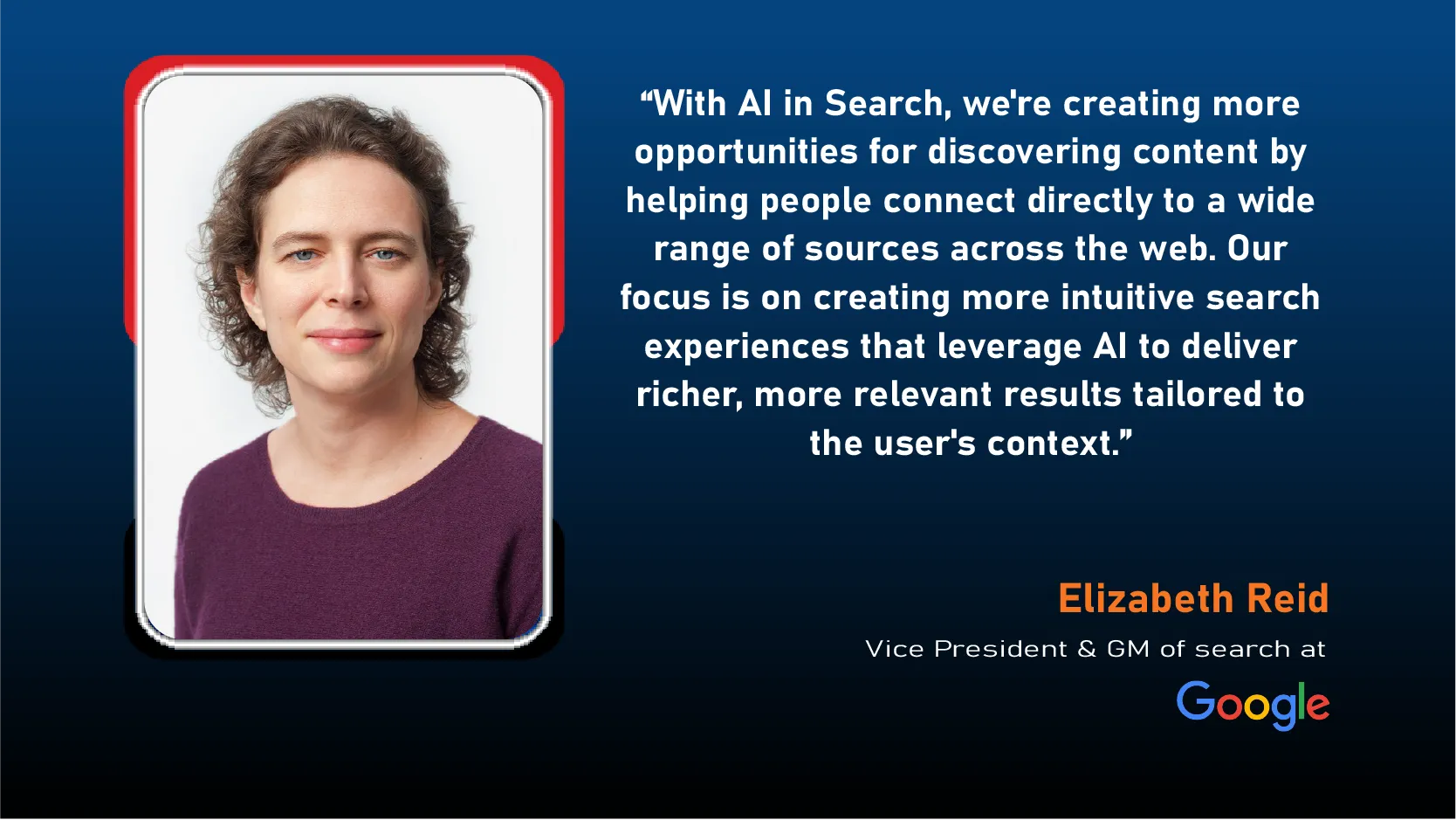Artificial intelligence and its applications are revolutionizing everything around us, including the ways we search for information online. With the advent of generative engines like Google’s Gemini and Microsoft’s Bing Chat, searches today have become more holistic and dynamic. These tools have the capability to generate multi-modal responses that go beyond text.

“With AI in Search, we’re creating more opportunities for discovering content by helping people connect directly to a wide range of sources across the web. Our focus is on creating more intuitive search experiences that leverage AI to deliver richer, more relevant results tailored to the user’s context,” says Elizabeth Reid, Vice President & GM of search at Google.
Marketers today have to get themselves acquainted with the new term Generative Engine Optimization. If you are a marketer and feeling lost with so many new algorithm updates and technical terms, do not worry; you are not alone. In this blog, we will cover how AI is transforming searches in search engines. If you are curious about how the generative engines will impact your content marketing strategies, keep reading this blog has some insights for you.
What is Generative Engine Optimization (GEO)?
Generative Engine Optimization (GEO) is referred to as a strategic framework developed to enhance the visibility of websites in generative engine responses. Traditional SEO techniques such as keyword optimization and backlinking will fall short when applied to generative models like those utilized in BingChat, Google’s SGE, and Perplexity.ai. These GEO models offer rich, structured responses rather than showcasing a list of ranked websites. GEO emerges as a specialized approach tailored to the unique mechanics of generative engines, focusing on improving how content is embedded and presented in these model-generated outputs.
What is the Difference Between SEO & GEO?
Search engine optimization (SEO) is a widely adopted approach that focuses on improving websites to get better rankings on traditional search engine result pages (SERPs). The optimization strategy includes the usage of targeted keywords, the creation of top-notch content, and making internal or external backlinks. SEO strategies revolve around how search engines such as Bing and Google index and navigate websites.
Generative Engine Optimization (GEO) or generative engines is the latest approach that has surfaced with the surge of AI-driven search engines. These engines use artificial intelligence frameworks to generate responses and solutions to queries instead of just classifying and ranking websites depending on keywords. Particularly, GEO is an improvement strategy that focuses on creating content that allures human readers and strikes a balance with AI-powered search engines.
Also Read: The Impact of Google AI Overview Feature
The Importance of GEO
Generative engine optimization is gaining popularity as AI-powered models continue to scale. The initial excitement around AI and its applications has started fading away, and now we are experiencing a phase where the masses have started gaining trust in AI applications, and their technologies are reaching maturity. In today’s competitive landscape, even leaders like Google now have to experience some serious competition from Bing’s AI integration, Perplexity, ChatGPT, and other powerful AI-powered platforms.
What is the Impact of GEO on Organic Search?
AI is revolutionizing the landscape of organic search, forcing organizations to revamp their marketing strategies. According to a report by TUYA Digital, the launch of generative AI responses and other factors has resulted in an 8.42% drop in Click-Through Rates (CTR) for organic search results across all top 10 positions on Google’s first page. According to another study, minimal modifications to the original content enhanced the visibility of the site by 30-40% on generative engines in comparison to other strategies. Traditional SEO practices will not be able to gain the required visibility by the organization. Enterprises need to integrate GEO strategies into their work operation to efficiently grab and retain users’ attention on AI-powered platforms.
“Generative AI is enabling us to reimagine search, providing more intuitive and natural ways for users to explore complex topics, ask follow-up questions, and dive deeper into subjects in a more conversational mode. We are pushing the boundaries of what search can do by integrating generative AI to provide more personalized and contextual answers. This allows users to ask naturally conversational questions and receive answers that synthesize information from multiple sources, creating a deeper and more seamless search experience,” says Elizabeth Reid, Vice President & GM of search at Google.
Changes in The Users’ Search Behavior Preferences
GEO is crucial because AI-powered search is revolutionizing the ways users find and consume information. Users are now using AI platforms to execute their research on products, future purchases, and required information. According to a report, ChatGPT attracts 260.2 million visitors each month.
These numbers show a paradigm shift in the increasing user trust in AI and its applications to offer accurate, customized, and reliable information at a rapid speed. As AI is becoming a normal part of everyday life, these tools are becoming more reliable to gather information. By optimizing the data on your website, businesses are ensuring that they are meeting the users where they are and providing them with the top-notch and relevant information they expect. This strategy is essential for organizations to increase their visibility to their target audience, engage with users, and get a competitive edge.
As this is a recent algorithm update rolled out by Google, businesses are still exploring strategies to minimize the impact on their visibility and click-through rates. In the next segment of the blog, we will explore what are the key features of GEO and its benefits.
What are the Key Features of GEO?
The following are the key features of GEO that organizations need to consider:
1. Enhancing Visibility
Enhancing the site for generative AI improves your visibility beyond traditional search engines. As users are shifting to AI platforms for their research needs, ensuring enhanced content allows businesses to grab the attention of a wider audience. Adopting generative engine optimization strategies helps organizations enhance content visibility by improving how websites are displayed within generative engine responses. This approach ensures that citations, statistics, and authoritative content are prominently featured.
2. Customizable Metrics
GEO employs strategic metrics for content creators to improve visibility in generative engines. Legacy SEO metrics like SERP ranking do not directly imply here. Generative engines leverage a much more sophisticated model to offer information in a summarized manner from multiple sources.
3. Black-box Optimization
Generative engine optimization works within the opaque systems of generative engines. These engines adapt to their proprietary algorithms through strategic content modification, without knowing the engine’s internal workings.
4. Domain-specific Adaptation
Leveraging GEO strategies emphasizes the need for domain-specific strategies, as optimization methods vary in effectiveness across different subject areas. For example, authoritative content performs better in debates, while factual citations improve responses in information-rich fields.
These are the key features of generative engine optimization that business decision-makers need to be aware of. GEO has immense benefits for organizations that will help them to enhance their content and visibility.
What are the Advantages of GEO?
The following are the benefits of generative engine optimization:
1. Offer Data-Driven Insights
GEO provides refined metrics and insights to revamp strategies and optimize engagement, offering a better understanding of how users interact with the brand’s content. Utilizing this data, enterprises can revamp their practices to effectively meet user demands, enhance content relevance, and drive more meaningful engagement.
2. Highly Evolved SEO Strategies
With the evolution in search technologies, embracing GEO allows digital marketing teams to stay efficient and adaptable and protect the organization’s online presence and competitive edge.
3. Enhance the Brand Reliability
Improving the website for AI platforms assists organizations in establishing their brand as a trusted source of information. As these tools synthesize data from various sources, if your content is included in the generative engine search responses, it will help enhance the brand’s credibility. Furthermore, emphasizing particular topics, people, places, and things ensures the content is precisely represented by AI, which helps to boost your brand authority.
4. Get a Competitive Edge
Enteprises that adapt to generative engine optimization strategies earlier will get a competitive edge. This approach will set your organization apart from the competition by establishing your brand as a forward-thinking authority.
5. Improved User Experience
Optimizing the website content according to the GEO requirements will help AI offer quick, relevant, and tailor-made responses. It is an effective way to enhance user satisfaction and loyalty. AI platforms provide more customized information by determining the context and user intent in an effective way.
These are the benefits that enterprises can seek if they adapt generative engine optimization strategies in their presales operations. In the next section, let us have a look at the ways organizations modify their strategies to be generative engine optimized.
What are the Best Generative Engine Optimization Strategies?
Below are the top practices that organizations can embrace to be generative engine optimized:
1. Authoritative Writing
Organizations can focus on crafting their content with a confident and knowledgeable tone. When readers sense authority in your words, especially on complex or debated topics, they are more likely to trust and engage with your material. This is particularly helpful when writing about subjects that require strong opinions or expertise.
2. Adding Statistics
It is crucial to incorporate relevant numbers and data into the content pieces. People tend to trust information backed by concrete figures, whether, it is a technical report, a legal argument, or an opinion piece. Including statistics strengthens your case and ensures your content stands out when search engines synthesize responses.
3. Improving Readability
Marketing teams need to make sure their content flows smoothly and is easy to read. Well-structured and clearly written text tends to engage readers more effectively. In fact, content that is easy to digest is often favored by AI-powered search engines, which prioritize delivering clear and concise responses to users.
4. Citing Credible Sources
Boost the trustworthiness of your content by linking to reliable and authoritative sources plays a pivotal role. This improves your credibility with readers. It also signals to search engines that your material is grounded with facts, making it more likely to be featured prominently in responses.
5. Incorporating Quotations
Enhance the depth of the content pieces by weaving in relevant quotes from trusted authorities or experts in the field. This is especially effective in areas like history or social studies, where direct quotes add authenticity and richness to the writing.
6. Simplifying Complex Ideas
When tackling complicated subjects, it is critical to explain them in a way that is easy for anyone to understand. By breaking down intricate concepts into simpler terms, organizations make their content more accessible. This approach engages a wider audience and appeals to search engines that value clarity in content.
7. Using Unique and Specialized Terms
Content marketing teams should sprinkle their content with industry-specific language or technical terms. When you include terminology that resonates with your target audience, especially for niche topics, it makes your content more relevant and tailored, which is something both humans and search engines appreciate.
By weaving these strategies naturally into your content, organizations can engage readers more effectively and enhance visibility in AI-driven search engines while maintaining a human touch that keeps your writing authentic.
Final Thoughts on Generative Engine Optimization
As we are at cross points with the new age in digital searches, it is quite evident that generative engines and generative engine optimization are revolutionizing the way content is discovered and consumed.
As marketing and content teams need to adapt to these evolutions, priority should be given to generating top-notch, authoritative content that resonates with both humans and machines. The generative engine optimization strategy laid out in this article can serve as a foundation for determining and utilizing the true potential of these cutting-edge systems. GEO is still in its infancy stage, and its evolution highlights the innovations and challenges it brings for organizations that are in the process of enhancing their digital visibility.

